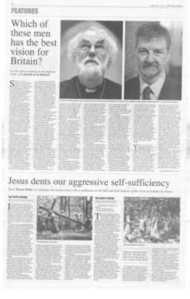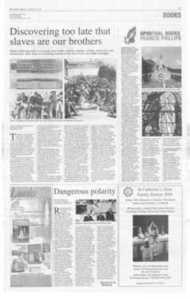Page 12, 15th February 2008
Page 12

Report an error
Noticed an error on this page?If you've noticed an error in this article please click here to report it.
Tags
Share
Related articles
Cinema
Cinema
12 Cert, 154 Mins
Cinema
Cgi Spoils The Magic Show
and possibly tears
LAI Mark Greayes There Will Be Blood
15 CERT, 158 MINS
There is definitely a consensus about the merits of There Will Be Blood. Oscar nominations have been heaped on it; critics have gushed over it; magazines and newspapers are full of it. Settling down in the cinema I was determined to defy the herd and expose it grandly as a flawed piece of film-making. By the time the credits rolled, however. I realised that everyone was right: it's a classic.
As the title might suggest, the film is weighty and menacing and severe, but underneath all of that there is a seam of comedy and sentimentality that occasionally finds its way to the surface. All together it makes for an extremely satisfying mixture.
The film charts the rise of Daniel Plainview (Daniel DayLewis) during the oil boom of early 20th-century America. It is his apparent good fortune to discover an "ocean of oil" underneath a remote village in California; he gets rich but his singleminded pursuit of oil and money hardens his misanthropy and smothers what little moral sense he had to start with.
At the beginning of the film we find Plainview down a hole in the middle of the desert: he is trying to find silver, and all of his energy is focused on hammering a wall with a pickaxe.
The scene is wordless and rather drawn out, and yet somehow it manages to be brilliantly compelling. There is a mysterious sense of foreboding and tragic weightiness, no doubt heightened by a thoroughly unsettling score (composed by Jonny Greenwood. guitarist of the rock band Radiohead).
Daniel Day-Lewis worked on the part for three years and, judging from the end result, his time was not wasted.
His character has an angry, smouldering, misanthropic intensity that is hidden — finthe most part — behind a well-mannered and highly wrought public persona.
In fact, he remains an enigma for much of the film. We don't even hear him talk until 20 minutes have passed, and then we hear a distinguished American accent delivering a speech to a crowd of investors. We learn nothing of his interior life until a
confessional moment with his brother more than halfway in. "I hate people," he admits with comic abruptness. "I see the worst in them."
For most of the film Plainview shows guts, initiative and only a mild ruthlessness — all qualities that could be regarded as virtues. But it becomes apparent that they are driven by a furious need to triumph over other people. I-le explains simply: 'I have competition in me. I want no one else to succeed."
His nemesis in the village of Little Boston is preacher and faith healer Eli Sunday, played with studied fervour and creepy selfbelief by Paul Dano. Eli is almost as power-hungry as Plainview and is alarmed to see his authority threatened.
Plainview also has an adopted son. known only as "HW" (played in a wonderfully odd and unreadable fashion by Dillon Freasier). HW is the one person for whom Plainview actually has some affection. Their bond appears to be the only thing that stops him from sinking into all-consuming hatefulness.
The oil itself is almost a character, too, since it has such a malign presence throughout the movie. When Plainview first discovers the stuff it burbles from the ground like primordial ooze. We then see the oil extractor smeared and slathered and dripping with it after being pulled from the bottom of the well. Most disturbingly of all, the bodies of men killed by falling machinery are left floating in it, submerged, lost. offered as some kind of sacrifice.
Plainview's moral decline is illustrated in quite sentimental fashion. After an accident HW is left permanently deaf, and Plainview decides that he ought to attend a school for deaf children in the city. They both sit on the train as it prepares to depart, and Plainview tells him that he is going to have a word with the conductor.
But as the train begins its slow chug. Plainview still hasn't come back — HW runs to the window and sees him on the plain walking away; he shouts and bangs on the glass but his cries are ignored. It is quite a heart-rending scene, and morally it's almost heavy-handed.
But Paul Thomas Anderson, despite his edgy reputation, is a very sentimental director. In his 1999 film Magnolia we were left snivelling into our hanky at the bad things people do to each other. And in There Will Be Blood, too.
It's not a bad thing: the hints of sentimentality and moral heavyhandedness actually work very well. As we hurriedly dry our eyes in the darkness of the cinema we should remind ourselves that such outpourings of grief are not necessarily the result of bad art, even if it does make us feel a bit silly.
blog comments powered by Disqus

















